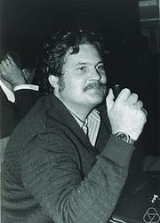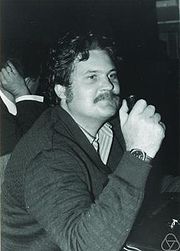
Rudolf Ahlswede
Encyclopedia

Mathematician
A mathematician is a person whose primary area of study is the field of mathematics. Mathematicians are concerned with quantity, structure, space, and change....
. Born in Dielmissen
Dielmissen
Dielmissen is a municipality in the district of Holzminden, in Lower Saxony, Germany....
, Germany
Germany
Germany , officially the Federal Republic of Germany , is a federal parliamentary republic in Europe. The country consists of 16 states while the capital and largest city is Berlin. Germany covers an area of 357,021 km2 and has a largely temperate seasonal climate...
, he studied mathematics
Mathematics
Mathematics is the study of quantity, space, structure, and change. Mathematicians seek out patterns and formulate new conjectures. Mathematicians resolve the truth or falsity of conjectures by mathematical proofs, which are arguments sufficient to convince other mathematicians of their validity...
, physics
Physics
Physics is a natural science that involves the study of matter and its motion through spacetime, along with related concepts such as energy and force. More broadly, it is the general analysis of nature, conducted in order to understand how the universe behaves.Physics is one of the oldest academic...
, and philosophy
Philosophy
Philosophy is the study of general and fundamental problems, such as those connected with existence, knowledge, values, reason, mind, and language. Philosophy is distinguished from other ways of addressing such problems by its critical, generally systematic approach and its reliance on rational...
. He wrote his Ph.D. thesis in 1966, at the University of Göttingen, with the topic "Contributions to the Shannon information theory in case of non-stationary channels". He dedicated himself in his further career to information theory
Information theory
Information theory is a branch of applied mathematics and electrical engineering involving the quantification of information. Information theory was developed by Claude E. Shannon to find fundamental limits on signal processing operations such as compressing data and on reliably storing and...
and became one of the leading representatives of this area worldwide.
Life and work
In 1977, he joined and hold a Professorship at the University of Bielefeld, Bielefeld, Germany. In 1988, he received together with Imre CsiszarImre Csiszár
Imre Csiszár is a Hungarian mathematician with contributions to information theoryand probability theory. In 1996 he won the Claude E. Shannon Award, the highest annualaward given in the field of information theory....
the Best Paper Award of the IEEE Information Theory Society for work in the area of the hypothesis testing as well as in 1990 together with Gunter Dueck for a new theory of message identification. He has been awarded this prize twice. As an emeritus of Bielefeld University
Bielefeld University
Bielefeld University is a university in Bielefeld, Germany. Founded in 1969, it is one of the country's newer universities, and considers itself a "reform" university, following a different style of organization and teaching than the established universities...
, Ahlswede received the Claude Elwood Shannon Award
Claude E. Shannon Award
The Claude E. Shannon Award of the IEEE Information Theory Society was instituted to honour consistent and profound contributions to the field of information theory. Each Shannon Award winner is expected to present a Shannon Lecture at the following IEEE International Symposium on Information Theory...
2006 of the IEEE information Theory Society. The prize is designated after Claude Elwood Shannon and since 1974 for outstanding achievements in the area of the information theory. The prize went only five times to scientists from outside the USA. In 2000, Rudolf Ahlswede, Ning Cai, Shuo-Yen Robert Li,and Raymond W. Yeung published a paper "Network Information Flow" in IEEE Transactions on Information Theory, VOL. 46, NO. 4, JULY 2000, this is the beginning of a new theory known as Network coding
Network coding
Network coding is a technique where, instead of simply relaying the packets of information they receive, the nodes of a network will take several packets and combine them together for transmission. This can be used to attain the maximum possible information flow in a network...
.
Rudolf Ahlswede died on December 18, 2010, at the age of 72.
Books
- R. Ahlswede and I. Wegener, Suchprobleme, Teubner Verlag, Stuttgart, 1979.
- R. Ahlswede and I. Wegener, Search Problems, English Edition of "Suchprobleme" with Supplement of recent Literature,
- R.L. Graham, J.K. Leenstra, and R.E. Tarjan (Eds.), Wiley-Interscience Series in Discrete Mathematics and Optimization, 1987.
- I. Althöfer, N. Cai, G. Dueck, L. Khachatrian, M.S. Pinsker, A. Sárkozy, I. Wegener and Z. Zhang (Eds.),Numbers, Information and Complexity, 50 articles in honour of Rudolf Ahlswede, Kluwer Academic Publishers, Boston, 2000.
- http://www.mathematik.uni-bielefeld.de/ahlswede/books/kluwer.html
- R. Ahlswede, L. Bäumer, N. Cai, H. Aydinian, V. Blinovsky, C. Deppe, and H. Mashurian (Eds.), General Theory of Information Transfer and Combinatorics, Lecture Notes in Computer Science, Springer-Verlag, Vol. 4123, 2006.
- http://www.springer.com/computer/foundations/book/978-3-540-46244-6
- R. Ahlswede, L. Bäumer, and N. Cai (Eds.), General Theory of Information Transfer and Combinatorics, Discrete Applied Mathematics, Volume 156, Issue 9, 2008.
- http://www.sciencedirect.com/science/issue/5629-2008-998439990-684519
- R. Ahlswede and V. Blinovsky, Lectures on Advances in Combinatorics, Universitext, Springer-Verlag, 2008.
- http://www.springer.com/math/numbers/book/978-3-540-78601-6
Sources
- http://www.mathematik.uni-bielefeld.de/ahlswede/
- http://www.math.uni-bielefeld.de/ahlswede/homepage/
- http://media.itsoc.org/isit2006/ahlswede/

